ByJoe Whittaker, Elizabeth Pearson, Ashley A Mattheis, Till Baaken, Sara Zeiger, Farangiz Atamuradova, Maura Conway
Drawing from interviews with 39 online extremism and terrorism researchers, this article provides an empirical analysis of these researchers’ experiences with institutional ethics processes. Discussed are the harms that these researchers face in the course of their work, including trolling, doxing, and mental and emotional trauma arising from exposure to terrorist content, which highlight the need for an emphasis on researcher welfare. We find that researcher welfare is a neglected aspect of ethics review processes however, with most interviewees not required to gain ethics approval for their research resulting in very little attention to researcher welfare issues. Interviewees were frustrated with ethics processes, indicating that committees oftentimes lacked the requisite knowledge to make informed ethical decisions. Highlighted by interviewees too was a concern that greater emphasis on researcher welfare could result in blockages to their ‘risky’ research, creating a ‘Catch 22’: interviewees would like more emphasis on their (and colleagues’) welfare and provision of concomitant supports, but feel that increased oversight would make gaining ethics approval for their research more difficult, or even impossible. We offer suggestions for breaking the impasse, including more interactions between ethics committees and researchers; development of tailored guidelines; and more case studies reflecting on ethics processes.
New Media & Society Online First, February 28, 2025

















